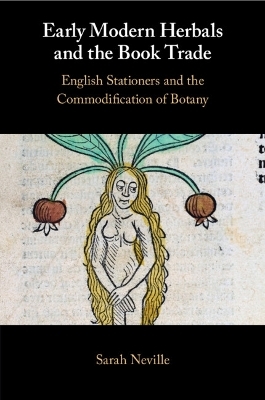
Early Modern Herbals and the Book Trade
Cambridge University Press (Verlag)
978-1-009-01360-4 (ISBN)
Between 1525 and 1640, a remarkable phenomenon occurred in the world of print: England saw the production of more than two dozen editions identified by their imprints or by contemporaries as 'herbals'. Sarah Neville explains how this genre grew from a series of tiny anonymous octavos to authoritative folio tomes with thousands of woodcuts, and how these curious works quickly became valuable commodities within a competitive print marketplace. Designed to serve readers across the social spectrum, these rich material artifacts represented both a profitable investment for publishers and an opportunity for authors to establish their credibility as botanists. Highlighting the shifting contingencies and regulations surrounding herbals and English printing during the sixteenth and early seventeenth century, the book argues that the construction of scientific authority in Renaissance England was inextricably tied up with the circumstances governing print. This title is also available as Open Access on Cambridge Core.
Sarah Neville is Assistant Professor in the Department of English at Ohio State University. She is an assistant editor of the New Oxford Shakespeare and an associate co-ordinating editor of the Digital Renaissance Editions.
Prologue. Milton's trees; Introduction. Authorizing English botany; Part I. A History of Herbals: 1. Authorship, book history, and the effects of artifacts; 2. The stationers' company and constraints on English printing; 3. Salubrious illustration and the economics of English herbals; Part II. Anonymity in the Printed English Herbal: 4. Reframing competition: the curious case of the little Herball; 5. The Grete Herball and evidence in the margins; 6. 'Unpublished virtues of the earth': books of healing on the English renaissance stage; Part III. Authors and the Printed English Herbal: 7. William Turner and the medical book trade; 8. John Norton and the redemption of John Gerard.
| Erscheinungsdatum | 17.08.2024 |
|---|---|
| Zusatzinfo | Worked examples or Exercises |
| Verlagsort | Cambridge |
| Sprache | englisch |
| Gewicht | 448 g |
| Themenwelt | Sachbuch/Ratgeber ► Gesundheit / Leben / Psychologie ► Alternative Heilverfahren |
| Geisteswissenschaften ► Sprach- / Literaturwissenschaft ► Anglistik / Amerikanistik | |
| Geisteswissenschaften ► Sprach- / Literaturwissenschaft ► Literaturwissenschaft | |
| Medizin / Pharmazie ► Naturheilkunde ► Phytotherapie | |
| ISBN-10 | 1-009-01360-2 / 1009013602 |
| ISBN-13 | 978-1-009-01360-4 / 9781009013604 |
| Zustand | Neuware |
| Informationen gemäß Produktsicherheitsverordnung (GPSR) | |
| Haben Sie eine Frage zum Produkt? |
aus dem Bereich


